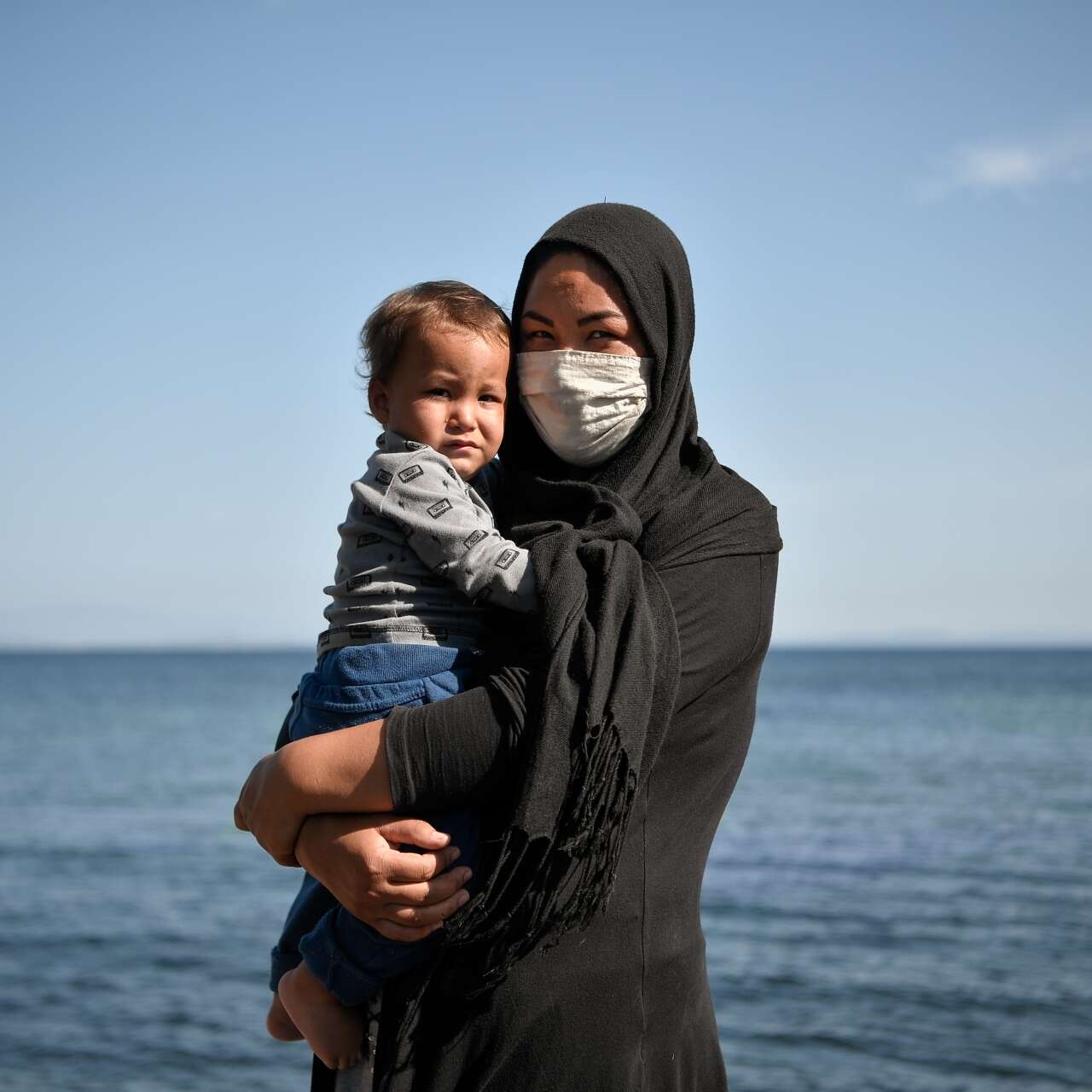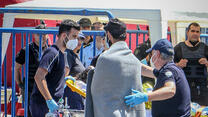Country facts
- Population: approx. 11 million
- Asylum seekers in Greece: over 200,000
- Rank in Human Development Index: 33 of 191
IRC response
- Started work in Greece: July 2015
- People assisted: over 80,000
- 450,000 people reached through Refugee.Info
In 2015, migration dominated headlines across Europe as over one million people arrived on its shores, fleeing conflict, economic turmoil and persecution. Eighty percent of people who crossed the Mediterranean Sea landed in Greece. Many were traumatized by the journey and required psychosocial support, medical aid and other forms of humanitarian assistance. The crisis of solidarity and reception in the European Union, coupled with a broken asylum system, has left Greece bearing much of the responsibility for the crisis.
Years on, people seeking safety and protection continue to arrive in Greece, which remains one of the main gateways to Europe for refugees and asylum seekers. Welcoming people with dignity and promoting integration is crucial to helping them build successful lives in their new home. However, thousands of people still reside in isolated, controlled access centers, cut off from opportunity. Those living in the cities may be stifled by lengthy asylum procedures and a challenging labor market, which makes finding sustainable employment difficult for everyone.
Through striking deals with third countries and the recently adopted EU Pact on Migration and Asylum, the European Union and its member states have focused on keeping people from reaching Europe at all costs, rather than prioritizing pathways to safety, humane reception and integration efforts. These policies continue to affect the world's most vulnerable, including the refugee and asylum seeking population in Greece.
People arriving in Greece face significant challenges in meeting their basic needs and exercising their fundamental rights due to a reception system that emphasizes deterrence over welcome. Refugees often endure prolonged waits—up to two years—for legal recognition, as initial asylum interviews can be delayed by a year due to inadequate interpretation services. These shortcomings in the asylum and reception system severely affect refugees’ dignity, well-being, and mental health.
Major issues include unsanitary and inadequate housing, a lack of accessible accommodation for people with special needs, poor-quality food and unsafe environments where harassment is common. Many live in isolated ,closed centers, contributing to a high rate of mental health struggles, with 85% of refugees reporting significant distress.
Most refugees living in cities are unable to find work to support their families, largely due to Greece’s ongoing economic struggles. Two-thirds of refugees and asylum seekers remain unemployed. This unemployment crisis extends to the local population as well, with Greece’s unemployment rate above 11% as of March 2024, the second highest in Europe. Strong integration efforts are needed to ensure both local residents and asylum seekers receive the assistance they need.
These ongoing challenges highlight the urgent need for comprehensive support that prioritizes safety, mental health and integration. Refugees require clear information about their prospects and available services. Women, especially those traveling alone with children, are at heightened risk of sexual violence and trafficking, underscoring the need for targeted interventions to ensure their safety. Children also need focused support to heal from trauma and access safe spaces that protect them from further harm.
IRC Hellas started operating in Greece in 2015, on the island of Lesvos, in response to the unprecedented number of refugees arriving on the island. Since then, the IRC has expanded our reach, providing support to people living in camps and cities across the country.
Our team of professionals in humanitarian response and social services is active in Athens, Thessaloniki and the island of Lesvos. Our advocacy team also works to protect and uphold the rights of refugees and asylum seekers in the country, and we provide nationwide up-to-date reliable information through Refugee.Info.
Economic recovery and development
Since 2017, the IRC Livelihoods team in Greece has been providing comprehensive integration and economic empowerment services for refugees, asylum seekers, migrants and other vulnerable communities. Our mission is to help individuals achieve financial independence through tailored employment readiness support, including job counseling, matching and employer engagement events. We also offer entrepreneurship development programs and skills-building activities, such as language and digital skills courses.
We believe workforce access is essential for successful integration. Our goal is to inform, train and empower participants, enabling them to build their capabilities and unlock their potential.
Information provision
The IRC launched Refugee.Info, a digital platform designed to empower refugees and asylum seekers with essential information on navigating their rights and accessing vital services. This online platform provides reliable, up-to-date details on legal rights, asylum procedures, healthcare, education, employment rights and more. Resources are available in English, French, Arabic, Farsi, Ukrainian, Urdu, and Somali.
Refugee.Info also offers an online helpdesk, allowing users to send individual messages for personalized support from trained staff.
Follow Refugee.Info on Facebook, Instagram, Telegram, and WhatsApp channels.
Legal aid
The IRC has partnered with A.S.P.I.D.A. to launch RAISE EU, a program designed to inform refugees of their rights and support their integration into Greek society. The program provides group information sessions to educate beneficiaries on EU values and their rights and engages local and national institutions through targeted advocacy to promote the effective implementation of these rights.
Advocacy
IRC Hellas advocates in Greece and the EU for the rights of asylum seekers and refugees, focusing on access to territory, fair asylum procedures, adequate reception conditions, protection services, information access and integration support.
Protection
The IRC is collaborating with Greece’s ministry of migration policy and local and international humanitarian organizations to address violence against women and girls and to meet the mental health and psychosocial needs of all refugees and asylum seekers. The IRC has also responded to the mental health needs of asylum seekers and the local community on the island of Lesvos. We have also worked with unaccompanied children curating safe spaces and sage accommodation.
As people continue to arrive in Greece, the IRC remains focused on meeting their basic needs, protecting them from exploitation and violence, and helping them build a better future for their families. Since a large percentage of refugees in Greece are likely to settle permanently, we will continue collaborating with local partners to ensure their successful integration into their new communities while also addressing the needs of the local population.
IRC Hellas started operating in Greece in 2015, on the island of Lesvos, in response to the unprecedented number of refugees arriving on the island. Since then, the IRC has expanded our reach, providing support to people living in camps and cities across the country.
Our team of professionals in humanitarian response and social services is active in Athens, Thessaloniki and the island of Lesvos. Our advocacy team also works to protect and uphold the rights of refugees and asylum seekers in the country, and we provide nationwide up-to-date reliable information through Refugee.Info.
Economic recovery and development
Since 2017, the IRC Livelihoods team in Greece has been providing comprehensive integration and economic empowerment services for refugees, asylum seekers, migrants and other vulnerable communities. Our mission is to help individuals achieve financial independence through tailored employment readiness support, including job counseling, matching and employer engagement events. We also offer entrepreneurship development programs and skills-building activities, such as language and digital skills courses.
We believe workforce access is essential for successful integration. Our goal is to inform, train and empower participants, enabling them to build their capabilities and unlock their potential.
Information provision
The IRC launched Refugee.Info, a digital platform designed to empower refugees and asylum seekers with essential information on navigating their rights and accessing vital services. This online platform provides reliable, up-to-date details on legal rights, asylum procedures, healthcare, education, employment rights and more. Resources are available in English, French, Arabic, Farsi, Ukrainian, Urdu, and Somali.
Refugee.Info also offers an online helpdesk, allowing users to send individual messages for personalized support from trained staff.
Follow Refugee.Info on Facebook, Instagram, Telegram, and WhatsApp channels.
Advocacy
IRC Hellas advocates in Greece and the EU for the rights of asylum seekers and refugees, focusing on access to territory, fair asylum procedures, adequate reception conditions, protection services, information access and integration support.
Protection
The IRC is collaborating with Greece’s ministry of migration policy and local and international humanitarian organizations to address violence against women and girls and to meet the mental health and psychosocial needs of all refugees and asylum seekers. The IRC has also responded to the mental health needs of asylum seekers and the local community on the island of Lesvos. We have also worked with unaccompanied children curating safe spaces and sage accommodation.





